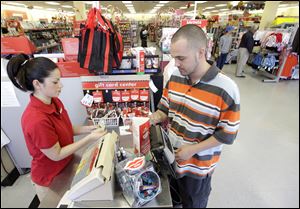
Shareholders hungry for cash held in recession
4/1/2011
Family Dollar rejected a takeover by Trian Fund Management and adopted a strategy against unsolicited offers.
American companies are holding $1.9 trillion in cash, a record. The large businesses that make up the Standard&Poor's 500 index, all of which answer to public shareholders, have $940 billion on hand -- $300 billion of it accumulated since late 2008, says Howard Silverblatt, senior index analyst at S&P.
Shareholders want companies to start using that cash. The most pressure is from activist investors, who buy stakes, then try to influence management to make changes in shareholders' interest.
"We've been in bunker mentality for too long," said Eric Jackson, who runs the hedge fund Ironfire Capital. He predicts activist shareholders are about to become "a lot noisier."
- Since the start of this year, 116 S&P 500 firms have raised dividends, up from 78 last year. Overall, S&P 500 firms paid $16.6 billion more this year in dividends than last year.
- Companies are buying back more of their stock. Kohl's, Conoco, and Intel all recently announced buyback plans. Stock buybacks by S&P 500 firms rose to a record $86.4 billion in the final quarter of 2010, the latest data available. That was 81 percent more than the same period a year ago.
- Companies are doing bigger deals than a year ago. Global mergers and acquisitions were valued at $755 billion for the first three months of the year, 24 percent more than the same period last year, says financial data-tracker Dealogic. The number of deals declined slightly, to 9,568 this year from 9,825 in early 2010.
Large investors want higher dividends because it gives them more cash to make other investments.
What's happened the last few months at Family Dollar shows the rift between firms and investors.
Trian Fund Management disclosed last July that it had bought a 6.6 percent stake in Family Dollar.
When the investment was announced, Trian promised to work with Family Dollar to boost sales and open new stores, and said it had ideas on the use of the retailer's cash. The dollar-store chain's cash balance ran about $503 million, a record high.
By September, Family Dollar had announced plans to spend $750 million, including cash and new debt, to buy back stock. In January, Family Dollar raised its quarterly dividend by 2.5 cents, to 18 cents a share.
But Trian wasn't satisfied. It made a $7 billion, all-cash, hostile bid for control of Family Dollar on Feb. 15 and announced it had raised its stake in Family Dollar to 7.9 percent, making it the largest shareholder.
Family Dollar rejected the bid in March, saying it undervalued the business, and adopted a defense strategy to discourage unsolicited offers. Trian responded by sending a letter to Family Dollar's board saying the firm had "embarked on a path of poor corporate governance."
Fights like this are likely to be more common this year if firms don't accelerate their use of cash.